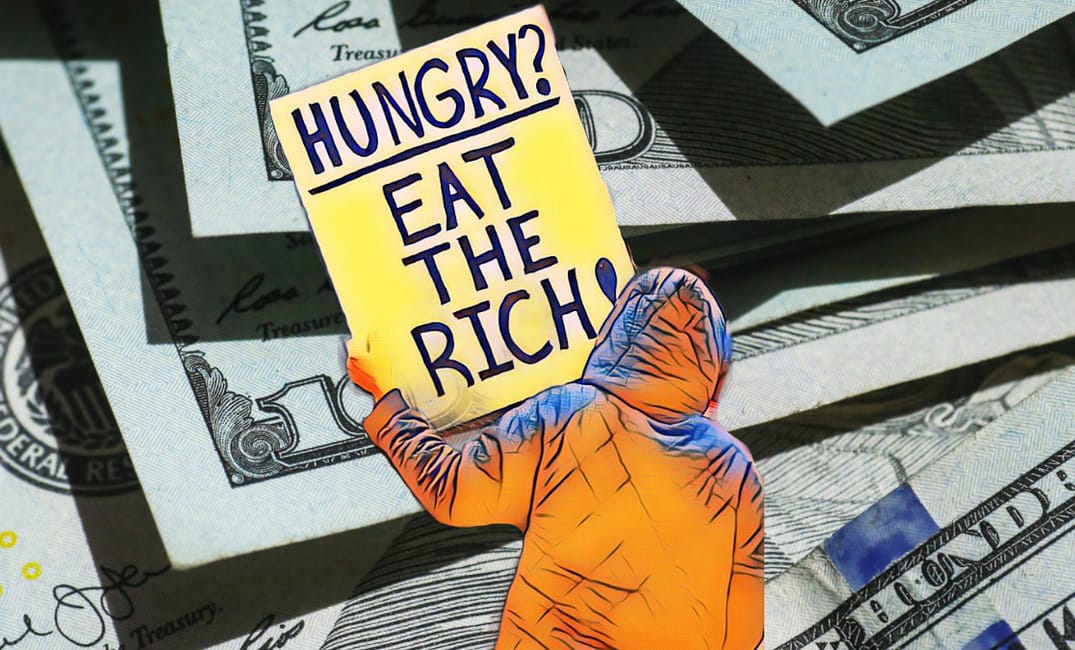By Banseka Kayembe
“Eat the rich” isn’t an uncommon phrase to hear on social media these days, especially from the younger generations. There appears to be a collective weariness from younger people that capitalism just isn’t working- and they are looking to other models instead, namely socialism.
Whilst it might be easy to patronisingly dismiss young people as being idealistic; a group that will naturally grow out of being anti-capitalist once they “grow-up”, a report by the rightwing think tank The Insitute for Economic Affairs called “Left Turn Ahead” says otherwise. It claims that anti-capitalism is more than just a “trend” but now a majority view amongst Gen Z and Millennials.
We spoke to the author of the report, Dr Kristian Niemietz, to find out what the report tells us about the political views of young people.

Support us!
Support us by contributing as little as £1 so we can continue to give young people a voice and a platform they deserve
£1.00
Can you tell us a bit about the report and its purpose?
After 2015, the dominant media narrative rapidly switched from “Young people are politically disengaged and apathetic” to “Young people are woke socialists”. You could see this shift happening in both left-wing and right-wing publications; it was almost independent of whether the author thought that this was a good thing or a bad thing.
But a lot of the media coverage of that phenomenon was anecdotal, speculative, and unsystematic. I wanted to bring some order into this. What do we really know about the attitudes of younger generations, especially on economic issues (in the broadest sense)? Do we have hard data, do we have clear patterns that stay more or less constant from survey to survey?
That is what this report does. Both by summarising the existing evidence we already have, from previous studies, and by discussing new, original data from a poll we commissioned ourselves. I think it is the most comprehensive overview of the economic attitudes of Millennials and Zoomers in Britain that you will find to date.
What kinds of policies are we seeing young people having support for, broadly speaking?
The report is less about specific policies, and more about general policy directions, about broad values, attitudes, and assumptions about economics. We find that the cliché of the “woke socialist Millennial” contains a lot of truth, even if it is a massive oversimplification, and the reality is a lot messier than that. We find that anti-capitalist, left-wing views are the mainstream views among Millennials and Zoomers. Being hostile to capitalism, and being in favour of a socialist alternative of some sort, is the mainstream opinion.
For someone like me, who believes that capitalism is vastly better than its reputation, that capitalism can be a brilliant system for increasing prosperity, fighting poverty, increasing personal autonomy, and even improving the environment – these survey results are obviously not encouraging. They show that my own opinions are not widely shared: they are an unpopular minority opinion.
But we are where we are. The point of the report was to produce an honest assessment. It was not supposed to tell me what I would like to hear.
According to your research, what are the main reasons why young people are gravitating towards more left-wing economic ideas?
On that, I can only speculate. My report cannot really tell you that. It shows you where we are, but not how, and why, we got there.
But I am convinced that Britain’s housing crisis plays a major role in this. The housing crisis is the source of most of Britain’s social and economic problems. Our housing costs are among the highest in the world. People feel ripped off (and rightly so), and then they wrongly blame “capitalism” for that.
Housing is one of the least capitalist sectors in our economy. The government decides who can build new housing, where, how much of it, and in what way. That is not “capitalism”. Countries and regions with more capitalist housing markets do not have anything like the problems that we have. But, again, that is my own “pro-capitalist” interpretation. Which, as the report shows, is clearly not widely shared.
I also think social media plays a role. Due to social media, there is just much greater peer pressure today to go along with the popular opinion of the day. And at least in the age groups we are talking about, “popular opinion” means “left-wing opinion”.
Why do you think people have been quick to dismiss young people’s growing political affiliations with the left as just a trend that will die out?
That is because the embracing of socialist ideas is often quite superficial. For a lot of people, socialist opinions have become a fashion statement: it is considered “hip” and “cool” to be a socialist. It is not a coincidence that one of the big fashion magazines, Teen Vogue, has jumped on that bandwagon, and now frequently runs articles on Marxism, or on various socialist political figures.
You can also see this very clearly on social media, where people often parade their anti-capitalist opinions, but if you ask them a critical question, it quickly turns out that they know very little about the subject. They just express that opinion, because it is the “cool” opinion to have, and, of course, the easiest way to collect likes and retweets.
So it is true that it is a trend. It just does not follow that it will quickly die out again. “Trend” does not mean “short-lived”. A trend can be around for decades.
Thanks for reading our article! We know young people’s opinions matter and really appreciate everyone who reads us.
Give us a follow on Instagram, Twitter and Facebook to stay up to date with what young people think.

